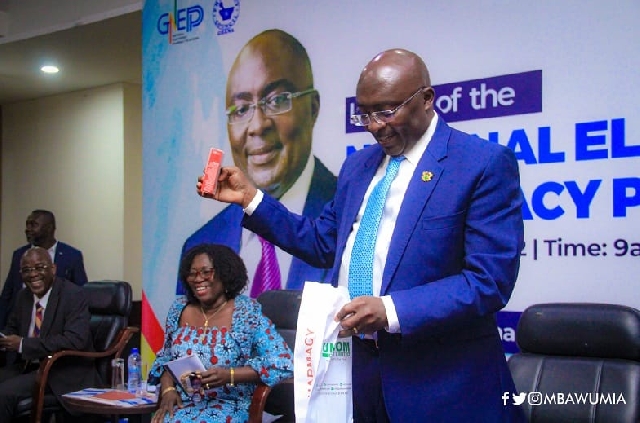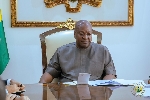NHIA reforms premised on Bawumia NPP initiatives, not new NDC policies — Dr. Ekua Amoakoh
 Dr Bawumia
Dr Bawumia
Dr. Ekua Amoakoh, Deputy Spokesperson to the former Vice-President, Dr. Mahamudu Bawumia, has explained that claims that the ongoing reforms at the National Health Insurance Authority (NHIA) are brand new initiatives conceived by the current NDC administration are inconsistent with the established public record.
In a rebuttal statement, she said the Authority may be rightfully preparing its managers for a nationwide rollout, “it is important to recognise that the pillars of these reforms — the National Telehealth Program, the E-Pharmacy Policy, the Biometric Membership Authentication System (BMAS), and the Cashless Payment Solution, did not originate today”.
According to her, these are long-running national projects that were initiated, launched, or significantly advanced under the previous NPP government, driven in large part by the digital health agenda championed by the former Vice-President Dr. Mahamudu Bawumia.
Dr. Amoakoh said that although the NHIA Deputy Chief Executive in charge of Operations, Dr. Senanu Kwesi Djokoto, has assured managers of a smooth nationwide rollout of these flagship reforms, it is crucial to place the initiatives in their proper historical context.
She explained that the reforms being highlighted are not fresh concepts conceived by the present administration — they are continuing projects whose foundations were laid years ago by the digital Dr. Bawumia.
National Telehealth Project
On the National Telehealth Programme, Dr. Amoakoh explained that any attempt to present it as a new NDC initiative “collapses under the weight of verifiable public records.” She recalled that the project was one of the most visible pillars of the NPP government’s digital health agenda and was officially launched by Dr. Bawumia on 13 November 2024.
Dr. Amoakoh noted that the NHIA’s own official communication in 2024 explicitly described the telehealth service as a national digital health project rolled out under the leadership of Dr. Bawumia and the then NHIA Chief Executive, Dr. Da-Costa Aboagye.
She explained that it was introduced as a direct extension of the government’s ongoing push to modernise healthcare following the medical drone delivery system, the E-Pharmacy platform, and the broader suite of digital health reforms.
Dr. Amoakoh recalled that during the launch at Ejisu in the Ashanti Region, Dr. Bawumia stated unambiguously that Telehealth was conceived to “bring medical consultations into the homes and hands of our people,” positioning it as part of the NPP government’s commitment to digital transformation.
She further noted that Dr. Bawumia laid out the vision: connecting every government health facility nationwide, ensuring equitable access regardless of location, and building a digitally driven, inclusive healthcare system.
Dr. Amoakoh added that the next phase — the establishment of virtual care booths and community-level diagnostic points across the country, an NHIA-Ghana Health Service-Pharmacy Council collaboration already in motion before the change of administration.
The Deputy Spokesperson for Dr. Bawumia stressed that at the same event, Dr. Da-Costa Aboagye celebrated the Telehealth rollout as a significant milestone in the NHIS’ forward march, detailing its capacity to bridge access gaps through text, USSD, calls, mobile apps, and web platforms.
Dr. Amoakoh noted that the full functionality —real-time audio/video consultations, OPD services, and remote medical support, was introduced under his leadership, not after.
“Every official fact points to one conclusion. The National Telehealth Program is not a new idea. It is an NPP-era project launched, branded, and operationalised under Dr. Bawumia’s digital health reforms. What we are seeing today is a continuation, sometimes repackaged, of work completed or significantly advanced before January 2025,” she emphasised.
E-Pharmacy Policy
On the E-Pharmacy Policy, Dr. Amoakoh reiterated that Ghana’s National Electronic Pharmacy Platform (NEPP) was conceived, developed, and launched during the NPP government.
She cited the official launch on 18 July 2022, officiated personally by Dr. Bawumia, with then NHIA CEO Dr. Bernard Okoe-Boye present—clear evidence that the policy predates the current administration.
She explained that the project began in 2019 when Dr. Bawumia challenged the Pharmacy Council to digitise pharmacy services. His office, she noted, provided the technical and policy support that shaped its design and implementation.
At the 2022 launch, she recalled, Dr. Bawumia hailed the platform as a core component of the government’s broader digital health transformation.
“By the time the system went live,” she said, “all regulatory approvals, pilots, integrations, and onboarding had already been completed under the NPP administration.”
“E-Pharmacy is not inherited; it is authored. Its documented history sits squarely within Bawumia’s digitalisation portfolio,” she stressed.
On the biometric reforms at the NHIA, Dr. Amoakoh insisted that both the MyNHIS App and the Biometric Membership Authentication System (BMAS) are “entirely NPP-era digital innovations.”
She referenced the December 5, 2022, launch of the MyNHIS App at UDS, Tamale—an official unveiling by Dr. Bawumia during NHIS Active Month. The platform, she said, was fully functional at launch, allowing citizens to register, renew and link their GhanaCard using their phones.
She also recalled that the NHIA CEO at the time publicly praised the NPP government for driving the digital transformation of the Scheme, even describing Dr. Bawumia as the “Digitisation Messiah.”
She noted that BMAS was already being piloted in 40 health facilities by March 2024, long before any administrative change. The project, she explained, was developed by the NHIA MIS Directorate in partnership with Margins Ghana Limited, with national rollout scheduled for mid-2024.
“From conceptualisation to piloting, every stage of BMAS and the MyNHIS App occurred under the NPP government. Nothing about these reforms began after January 2025,” she maintained.
Dr. Amoakoh stated that all these reforms were launched, initiated, or significantly advanced under the previous NPP government. She explained that the timelines and public records unequivocally attribute these transformative projects to Dr. Bawumia’s leadership.
Dr. Amoakoh said that while NHIA Deputy Chief Executive in charge of Operations, Dr. Senanu Kwesi Djokoto, emphasises staff preparedness for rollout, the foundation and execution of these reforms remain rooted in the NPP era.
“It is undeniable that the foundation, vision, and execution of these digital health reforms are firmly rooted in the previous NPP government’s leadership, spearheaded by Dr. Bawumia and his commitment to modernising Ghana’s health insurance system,” she further added.
Source: Classfmonline.com/Cecil Mensah
Trending News

'Commercial farming is Ghana’s future': Ayariga bemoans multibillion-dollar drain, warns against dependence on imports
17:44
OSP rejects Martin Kpebu’s claims of “Self-Investigation,” describes allegations as misleading
07:14
Kwabena Agyepong's campaign manager endorses Bawumia ahead of NPP presidential primary
07:38
Accra Mayor preps city for Christmas, leads sanitation and beautification drive
19:41
WAEC exec outlines skills gap causing decline in math performance
23:39
Nungua Stool defends government board appointee Ben Danso amid land dispute
17:38
Ofankor-Nsawam-Kumasi road: President Mahama pleased with 'rapid progress' after last visit 90 days ago, anticipates April 2026 finish
01:17
Minority demands prosecution over alleged GHS10m overspending at Transport Ministry
08:33
Ablekuma West MP secures jobs for constituents through targeted lobbying efforts
09:36
Ghana AIDS Commission reaffirms commitment to ending HIV epidemic by 2030
10:54



